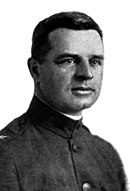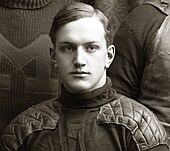1901 College Football All-America Team
| 1901 College Football All-America Team |
|---|
| College Football All-America Team |
| 1901 college football season |
| 1899 1900 ← → 1902 1903 |

The 1901 College Football All-America team is composed of
Consensus All-Americans


In its official listing of "Consensus All-America Selections," the NCAA designates players who were selected by either Camp or Whitney as "consensus" All-Americans.[1] Using this criterion, the NCAA recognizes 18 players as "consensus" All-American for the 1901 football season.[1] The consensus All-Americans are identified in bold on the list below ("All-Americans of 1901") and include the following:
- Wood-Forbes Mission.
- Paul Bunker, a tackle for Army whose posthumously published account of his time as a Japanese prisoner of war became a best-seller. A portion of the U.S. flag flown at Corregidor was saved from burning by Bunker and kept hidden as a patch inside his shirt; the patch remains on display in the West Point museum.
- Dave Campbell, an end for Harvard who was inducted into the College Football Hall of Fame in 1958.[4]
- Charles Dudley Daly, a quarterback for Harvard who was inducted into the College Football Hall of Fame in 1951.[5] In 2008, Sports Illustrated sought to answer the question, "Who would have won the Heisman from 1900-1934?"[6] Its selection for 1901 was Daly of Army, a player who put on "a one-man show" against Navy, scoring all 11 of Army's points.[6]
- Bill Morley, a halfback for Columbia who was inducted into the College Football Hall of Fame in 1971.[7][8] He became a prominent cattle and sheep rancher in New Mexico.[9]
- Neil Snow, an end for Michigan who scored five touchdowns in the 1902 Rose Bowl and was inducted into the College Football Hall of Fame in 1960.[10]
- Bill Warner, a guard for Cornell who was inducted into the College Football Hall of Fame in 1971.[11] Warner later served as the head football coach at Cornell, North Carolina, Colgate, St. Louis, and Oregon.[12]
- Harold Weekes, a halfback for Columbia who was inducted into the College Football Hall of Fame in 1954.[13]
Concerns of Eastern bias
The All-America selections by Camp and Whitney were dominated by players from the East and the Ivy League in particular. In 1901, 17 of the 18 consensus All-Americans came from Eastern universities, and 14 of 18 played in the Ivy League.[1] The undefeated Harvard Crimson team had eight players who were designated as consensus All-Americans. The only four consensus All-Americans from schools outside the Ivy League were Neil Snow of Michigan, Paul Bunker and Charles Dudley Daly of Army, and Walter Bachman of Lafayette.[1]

The dominance of Eastern players led to criticism over the years that the All-America selections were biased against players from the leading Western universities, including Chicago, Michigan, Minnesota, Wisconsin, and Notre Dame.[14][15] During the 1901 season, Fielding H. Yost's "Point-a-Minute" team at Michigan compiled an 11–0 record and outscored its opponents by the unprecedented total of 550 to 0.[16][17] Four Michigan players were chosen for All-Western teams: end Neil Snow, halfback Willie Heston, quarterback Boss Weeks, and tackle Bruce Shorts.[18][19] Another strong team from the West was Wisconsin which compiled a 9–0 record and outscored opponents 316 to 0.[20] Yet, only one player from a western school, Snow of Michigan, was recognized as a first-team All-American in 1901.[1] Caspar Whitney named two Wisconsin players, tackle Art Curtis and halfback Al "Norsky" Larson, as second-team All-Americans.[3]
Unofficial selectors
In addition to Camp and Whitney, other sports writers and publications selected All-America teams in 1901, though such lists have not been recognized as "official" All-America selections by the NCAA. The list below includes the All-America selections made by the New York Post and The Philadelphia Inquirer.[21][22] Only four players were unanimously selected by Camp, Whitney, the New York Post, and The Philadelphia Inquirer. They were Dave Campbell, Oliver Cutts, Charles Dudley Daly, and Robert Kernan.
All-Americans of 1901
Ends
- Dave Campbell, Harvard (College Football Hall of Fame) (WC-1; CW-2; NYP-1; PI-1)
- Ralph Tipton Davis, Princeton (WC-1; CW-2; NYP-2; PI-1)
- Edward Bowditch, Harvard (WC-2; CW-1; NYP-1)
- Neil Snow, Michigan (College Football Hall of Fame) (CW-1)
- Joseph R. Swan, Yale (WC-2; NYP-2)
- Howard Henry, Princeton (WC-3)
- Charley Gould, Yale (WC-3)
Tackles

- Oliver Cutts, Harvard (WC-1; CW-1; NYP-1; PI-1)
- Paul Bunker, Army (College Football Hall of Fame) (WC-1; CW-2; NYP-1)
- Crawford Blagden, Harvard (WC-2; CW-1; NYP-2)
- Williamson Pell, Princeton (WC-3; NYP-2)
- James Hogan, Yale (PI-1)
- Arthur Curtis, Wisconsin (CW-2)
- George Goss, Yale (WC-3)
Guards

- Bill Warner, Cornell (College Football Hall of Fame) (WC-1; NYP-1; PI-1)
- William George Lee, Harvard (WC-1; CW-2; NYP-2)
- Charles A. Barnard, Harvard (WC-2; CW-1)
- Sanford Hunt, Cornell (WC-2; CW-1)
- Herman Olcott, Yale (WC-3; NYP-1)
- Martin Wheelock, Carlisle (WC-2 [as T], PI-1)
- J. F. Dana, Princeton (NYP-2)
- M. F. Mills, Princeton (CW-2)
- John Teas, Penn (WC-3)
Centers
- Henry Holt, Yale (WC-1; CW-2; NYP-1)
- Walter E. Bachman, Lafayette (WC-2; CW-1)
- Charles Sprague Sargent, Harvard (PI-1)
- Elbridge Howe Green, Harvard (NYP-2)
- Hubert Fisher, Princeton (WC-3)

Quarterbacks
- Charles Dudley Daly, Army (College Football Hall of Fame) (WC-1; CW-1; NYP-1; PI-1)
- John de Saulles, Yale (WC-2; NYP-2)
- Alfred A. Brewster, Jr., Cornell (CW-2)
- Jimmy Johnson, Carlisle (WC-3)
Halfbacks
- Robert Kernan, Harvard (WC-1; CW-1; NYP-1; PI-1)
- Harold Weekes, Columbia (College Football Hall of Fame) (WC-1; NYP-1)
- Bill Morley, Columbia (College Football Hall of Fame) (WC-3; CW-1)
- Marshall S. Reynolds, Penn (PI-1)
- Adam Casad, Army (NYP-2)
- George B. Chadwick, Yale (CW-2; NYP-2)
- Al "Norsky" Larson, Wisconsin (CW-2)
- Henry Purcell, Cornell (WC-2)
- A. W. Ristine, Harvard (WC-2)
- Willie Heston, Michigan (WC-3)

Fullbacks
- Thomas Graydon, Harvard (WC-1; CW-1; NYP-1)
- David Dudley Cure, Lafayette (WC-2; CW-2; NYP-2)
- Henry Schoellkopf, Cornell (WC-3)
Key
- WC =
- CW = Caspar Whitney published in Outing magazine[3]
- NYP = New York Post[21]
- PI = The Philadelphia Inquirer, selected by Dr. N.P. Stauffer[22]
Bold = Consensus All-Americans[1]
See also
References
- ^ a b c d e f g h "Football Award Winners" (PDF). National Collegiate Athletic Association (NCAA). 2016. p. 6. Retrieved October 21, 2017.
- ^ a b "All-America Teams". Walter Camp Football Foundation. Archived from the original on February 13, 2013.
- ^ a b c Caspar Whitney (1902). "The Sportsman's View-Point" (PDF). Outing. Archived from the original (PDF) on July 23, 2012. Retrieved February 20, 2010.
- ^ Dave Campbell at the College Football Hall of Fame
- ^ Charlie Daly at the College Football Hall of Fame
- ^ a b Mike Beacom (December 12, 2008). "Who would have won the Heisman from 1900-1934". Sports Illustrated.
- ^ George Baldwin (April 1, 1971). "Meet the Morleys -- A fascinating family: N.M. son makes football hall of fame; dad brought Santa Fe rails to state". The Albuquerque Tribune.(available at newspaperarchive.com)
- ^ Bill Morley at the College Football Hall of Fame
- ^ "W. Ray Morley, Long Resident of State, Dies in California: Was Football Star, Cattleman, Banker and One of New Mexico's Most Picturesque Characters". Albuquerque Journal. May 30, 1932. p. 1.
- ^ Neil Snow at the College Football Hall of Fame
- ^ Bill Warner at the College Football Hall of Fame
- ^ "William J. "Bill" Warner Records Year by Year". College Football Data Warehouse. Archived from the original on October 13, 2012. Retrieved January 25, 2013.
- ^ Harold "Harry" Weekes at the College Football Hall of Fame
- ^ "All-American Teams of East Are Jokes: Critics Who Never Saw Western Teams Play to Name Best in Country -- Forget About Michigan, Minnesota and Illinois". The Mansfield News. December 8, 1910.
- ^ Ross Tenney (December 31, 1922). "Much Dissatisfaction Over Camp's All-American Team: Football Dean Is Accused of Favoring East; Walter Camp Soundly Scored For 'Poorest Teams Ever Foisted Upon Public'". The Des Moines Capital.
- ^ "1901 Football Team". University of Michigan, Bentley Historical Library. Archived from the original on December 14, 2007. Retrieved November 21, 2007.
- ^ Jesse J. Ricks (1901). "Introductory Review". Michigan Daily-News Football Year-Book. Ann Arbor Printing Company. Retrieved March 15, 2010.
- ^ "The Middle Western Football Season" (PDF). The Outing Magazine. 1902. p. 501. Archived from the original (PDF) on August 10, 2010. Retrieved March 14, 2010.
- ^ "Walter Camp's All-Western Team". Michigan Alumnus. January 1902. p. 179. Retrieved March 20, 2010.
- ^ "1901 Wisconsin". College Football Data Warehouse. Archived from the original on November 4, 2012. Retrieved January 25, 2013.
- ^ a b "All-American Team: Harvard Football Players in the Majority". Naugatuck Daily News. December 11, 1901.
- ^ a b "Dr. Stauffer's Idea of an All-American". The Philadelphia Inquirer. December 8, 1901.
